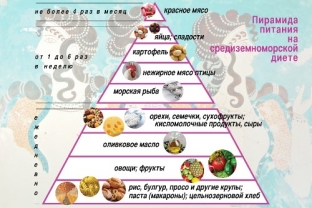The diet, which is called "diet" in the North, for the inhabitants of the Mediterranean coast – this is the usual way of eating. The Mediterranean diet is characterized by slight restrictions and the use of excess unsaturated fats instead of animal fats. Also, the Mediterranean menu involves the daily use of a large number of vegetables and fruits and the weekly preparation of fish dishes. So why the Mediterranean diet is considered the best for the figure, delicious for gourmets and good for the heart and blood vessels, we will consider in this article.
Peculiarities of the Mediterranean diet: what scientists say
The diet is based on seafood, olive oil, whole grains and nuts.
The reason that the Mediterranean diet is considered the most gentle, tasty and useful for the cardiovascular system, – this is the presence of unsaturated fatty acids, which are found in excess in foods (fish, olives).
Scientists have found that the simultaneous consumption of vegetables, olive oil and nuts provokes the interaction of unsaturated fatty acids with nitrogen, resulting in a group of components – fatty acids. This reaction leads to a decrease in blood pressure and healing of the heart muscle.
The secret of success for weight loss when eating Mediterranean cuisine is to saturate the body with fatty acids: monounsaturated and polyunsaturated.
Monounsaturated fatty acids are found in nuts, avocados, vegetable oil, and polyunsaturated – in fish.
Read also: Fatty Benefits: A Complete Guide to Omega-3 Fatty Acids
The benefits of the Mediterranean diet for the figure, heart and blood vessels:
- promotes weight loss and natural weight loss;
- strengthens the heart and blood vessels;
- normalizes cholesterol levels;
- strengthens the endocrine system;
- prevents the development of coronary heart disease, heart failure – as prevention of cardiovascular diseases;
- helps lower blood pressure.
Read also: Nutrition to strengthen blood vessels – to avoid cardiovascular diseases
Mediterranean diet menu: how to eat right
The Mediterranean diet is said to be centered on fish, olive oil and red wine. But the diet does not end there.
Daily consumption of these products:
- cereals: rice, cereals, corn, bread;
- peas, beans;
- olive oil;
- fruits and vegetables;
- hard cheese, milk;
- herbs: basil, thyme, oregano;
- potatoes;
- red wine.
A few times a week should be consumed:
- sea fish;
- other seafood;
- meat (poultry);
- eggs (no more than 4 per week).
It is also shown to increase the effect of losing weight and improving the cardiovascular system to use the following products: cottage cheese and homemade yogurt & nbsp; (sometimes), nuts, soups and smoothies, vegetable broths. You are also allowed to indulge in whole pasta and homemade noodles, and as healthy sweets – honey and jam.

See also: The best foods for the heart: to keep the engine running properly
Mediterranean Diet Rules:
- fractional diet, 4-5 times a day;
- food rich in proteins, eaten in the late afternoon;
- dairy products should not be consumed very often;
- cook only with olive oil;
- eat as many fruits, vegetables and herbs as possible;
- replace sugar with honey;
- limit bread consumption.
What dishes can be prepared on the Mediterranean diet: soups (gazpacho, minestrone, pesto), boil or stew vegetables and meat, fish. You can also grill fish and meat. Such nutrition for the heart and figure involves the preparation of all kinds of vegetable salads seasoned with olive oil, fruit salads seasoned with lemon or orange juice.
This diet is also suitable for pregnant women. Interestingly, if the expectant mother adheres to the rules of the Mediterranean diet, then the child's risk of developing allergies and asthma is reduced, and the heart and blood vessels are strengthened. Such a diet is also called a diet for the heart and the best nutrition for weight loss.






Add a comment